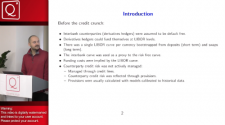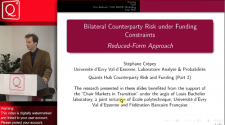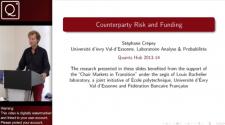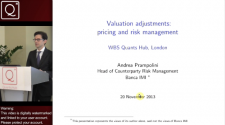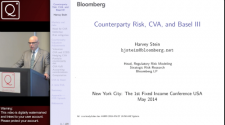Workshop view
Back to Shop
Monte Carlo Simulation in Finance (Part 2)
Monte Carlo Simulation in Finance: Models, Algorithms and Practice with Application to Derivatives Pricing, Risk Measures and CVA
Course Running Time: 5 Hours 15 Minutes
Introduction: (Running Time: 06:52)
CVA and Interest Rates (Running Time: 1:25:15)
Variance Reduction Methods: (Running Time: 1:46:38)
Monte Carlo Simulation and Stochastic Volatility (Running Time: 1:04:48)
Advanced Monte Carlo - American MC, Early Exercise and CVA (Running Time: 1:02:21)
Advanced Monte Carlo - Implementation and Greeks (Running Time: 44:47)
Introduction: (Running Time: 06:52)
CVA and Interest Rates (Running Time: 1:25:15)
- Fundamentals of Interest Rates and Challenges after 2007
- CVA and other Adjustments
- CVA – Difficulties of CVA Simulation
- Models for interest rate term structure evolution
- Short Rate models
- Market models
- CVA – Solutions to CVA Simulation
Variance Reduction Methods: (Running Time: 1:46:38)
- Controlling an Error
- Standard Variance Reduction Methods
- Antithetic Sampling
- Control Variates
- Importance Sampling
- Stratification
- Weighted Monte Carlo
- Multi Level Monte Carlo
Monte Carlo Simulation and Stochastic Volatility (Running Time: 1:04:48)
- The Smile Phenomenom
- The Heston and SABR Stochastic Volatility Model
- The Quadratic Exponential Scheme and its Implementation
- Exact Schemes for Heston and SABR
- Exponential Variance Gamma Model
- Exponential Variance Gamma Model with Stochastic Volatility
- Subordination and its Implementation
Advanced Monte Carlo - American MC, Early Exercise and CVA (Running Time: 1:02:21)
- Parametrisation of the Exercise boundary
- Random Trees
- State space partioning
- Stochastic Mesh Methods
- Stochastic Backward Equations
- Iteration Method
- Malliavin Calculus
- (Least Squares) Regression
- Dual Method
Sensitivities
- Models
- Finite Differences (Bump and Revalue)
- Pathwise Methods
- Forward Method
- Adjoint Method
- Likelihood Ratio
- Full Likelihood Ratio
- Proxy Method
- Hybrid Methods
Advanced Monte Carlo - Implementation and Greeks (Running Time: 44:47)
Implementation of Monte Carlo Simulation needs methods from:
- Linear Algebra
- Distributions / Probability Theory
- Random Number Generators / Number Theory
- Discretisation Schemes / Numerical Mathematics
- Analysis
- A programming language
- Object Oriented Programming for reusable code
Summary:
The goal of this two day seminar is to provide a detailed overview, offering insights into the latest techniques of modeling uncertainty in financial markets and demonstrating computational methods to tackle the industry applied models. We show the applicability of Monte Carlo simulation to derivatives pricing, risk measurements or CVA calculation.
We explain how the basic method is set up and we discuss the main ingredients. Finally, we discuss methods for improving and speeding up the method as well as recent techniques for calculating Greeks.
Each single topic is illustrated using Matlab code (No Laptops are needed for this event, however delegates will be given example sheets) .
The seminar is an ideal way to get a detailed overview of Monte Carlo methods and how to apply such techniques to problems arising in finance.
Main Topics:
This seminar discusses the application of Monte Carlo simulation to financial problems. Problems include scenario generation, risk measures, derivatives pricing or CVA calculation. The bullet points are:
• Probability Theory and Stochastic Processes
• One and multifactor models
• General purpose and special sampling schemes for e.g. Heston or SABR models
• Static and dynamic Monte Carlo Methods
• Risk Measures via scenario generation
• Derivatives pricing and hedging strategies
• Interest rate simulation and CVA
• Calculating sensitivities (‘Greeks’) and early exercise rights
• Implementing Monte Carlo methods
Methods:
• Presentation (slides)
• Illustration using computer examples
Prerequisites:
To participate in this course, you need to have a basic background in stochastic modelling but all the concepts and models are introduced and discussed in detail.
Topics:
CVA - Simulating Future Interest Rates
- Simulating Short Rate Processes
- Hull-White
- CIR
- Calculating CVA/DVA/FVA for Fixed Income Products
Speeding up and improving your Monte Carlo
- Variance Reduction Techniques
- Antithetic Sampling
- Control variates
- Importance Sampling
- Stratification
- Multi-Level Monte Carlo
- Quasi Random Numbers
- Halton Sequence
- Sobol Sequence
Simulating Multi-Dimensional Models
- Introducing Dependence
- Correlation
- Copula
- Scenario Generation and Risk Measures (Calculating CVaR using Simulation)
- Multi-Dimensional Normals
- Simulating Market Models (LMM)
- Simulating Stochastic Volatility Models (SABR and Heston)
Greeks (Adjoint, Proxies) and Early Exercise
- The Adjoint and Proxy Methods
- American Monte Carlo
- Bermudan Options
- Backward Script for CVA calculation
- Illustration using Libor Market Model
Implementation Issues (from Algorithms to Code II)
- Choosing the Language for Development
- Object Oriented Design II
Academic level
Topic
CVAPublished date
7 March 2014Price
£199.00Related workshops
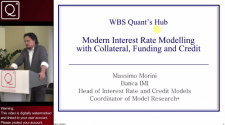
Massimo Morini
Interest Rate Modelling: Modern Interest Rate Modelling with Collateral, Funding and Credit (Part 2)
4 March 2014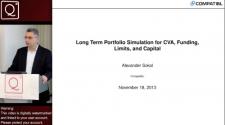
Alexander Sokol
XVA: Long Term Portfolio Simulation for CVA, Funding, Limits, and Capital
7 March 2014